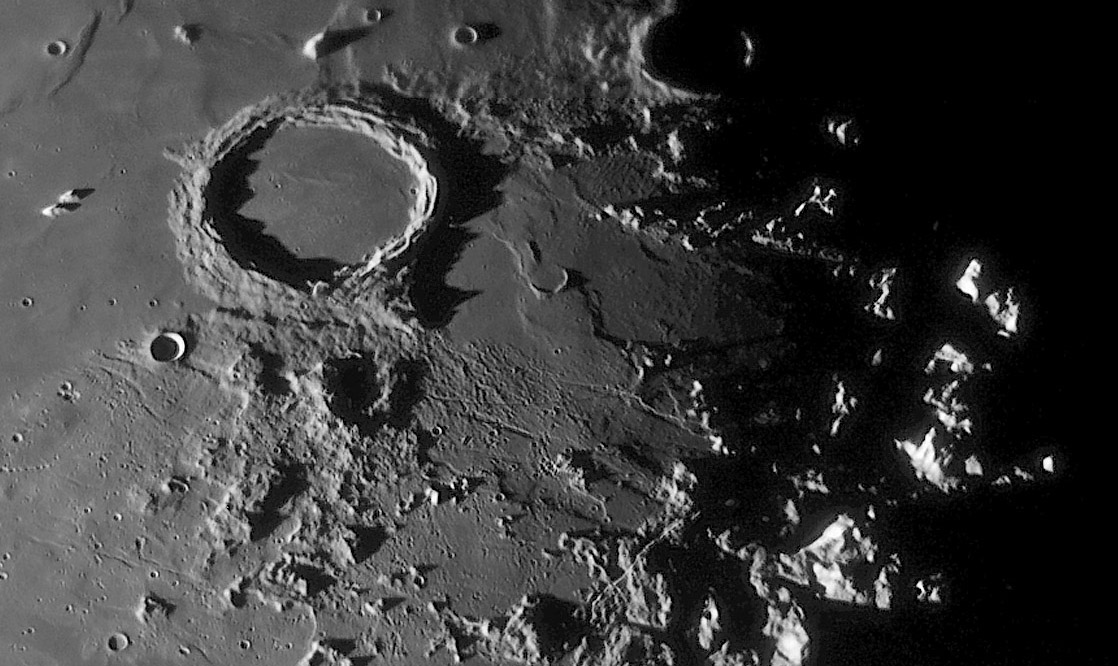Difference between revisions of "August 24, 2010"
| Line 3: | Line 3: | ||
<!-- ws:start:WikiTextHeadingRule:1:<h1> --> | <!-- ws:start:WikiTextHeadingRule:1:<h1> --> | ||
<!-- ws:start:WikiTextLocalImageRule:16:<img src="/file/view/LPOD-Aug24-10.jpg/157969293/LPOD-Aug24-10.jpg" alt="" title="" /> -->[[File:LPOD-Aug24-10.jpg|LPOD-Aug24-10.jpg]]<!-- ws:end:WikiTextLocalImageRule:16 --><br /> | <!-- ws:start:WikiTextLocalImageRule:16:<img src="/file/view/LPOD-Aug24-10.jpg/157969293/LPOD-Aug24-10.jpg" alt="" title="" /> -->[[File:LPOD-Aug24-10.jpg|LPOD-Aug24-10.jpg]]<!-- ws:end:WikiTextLocalImageRule:16 --><br /> | ||
| − | <em>image by [mailto:nsmith10000@yahoo.co.uk | + | <em>image by [mailto:nsmith10000@yahoo.co.uk Nick Smith]</em><br /> |
<br /> | <br /> | ||
| − | This piece of a large [http://www.pbase.com/nicksmith/image/127746350 | + | This piece of a large [http://www.pbase.com/nicksmith/image/127746350 mosaic] by Nick includes a number of rilles and other interesting features of the [http://the-moon.wikispaces.com/Apennine+Bench+Formation Apennine Bench Formation]. The name comes from US Geological Survey mappers in the 1960s who recognized that the hilly and rille-cut area between the front of the Apennine Mountains (far right) and Archimedes was neither the original floor of the Imbrium Basin nor Mare Imbrium lavas. It is older than the mare, and as Apollo orbiting instruments discovered, is rich in KREEP and the radioactive element thorium. The current view is that the Bench is made of a volcanic rock of different chemical composition than the normal dark maria - such as the patch of Palus Putredinis (right center). But what caught my eye was the washboard pattern of linear ridges and toughs in the upper right near Autolycus. The ridges are not parallel, as they look at first glance, but are actually radial from Autolycus. They are lines of ejecta and secondary craters from Autolycus, beautifully shown.<br /> |
<br /> | <br /> | ||
| − | <em>[mailto:tychocrater@yahoo.com | + | <em>[mailto:tychocrater@yahoo.com Chuck Wood]</em><br /> |
<br /> | <br /> | ||
<strong>Technical Details</strong><br /> | <strong>Technical Details</strong><br /> | ||
| Line 14: | Line 14: | ||
<strong>Related Links</strong><br /> | <strong>Related Links</strong><br /> | ||
Rükl plate [http://the-moon.wikispaces.com/R%C3%BCkl+22 22]<br /> | Rükl plate [http://the-moon.wikispaces.com/R%C3%BCkl+22 22]<br /> | ||
| − | Nick's [http://www.pbase.com/nicksmith | + | Nick's [http://www.pbase.com/nicksmith website]<br /> |
<hr /> | <hr /> | ||
| − | <div>You can support LPOD when you buy any book from Amazon thru [http://www.lpod.org/?page_id=591 | + | <div>You can support LPOD when you buy any book from Amazon thru [http://www.lpod.org/?page_id=591 LPOD!]<br /> |
</div> | </div> | ||
---- | ---- | ||
===COMMENTS?=== | ===COMMENTS?=== | ||
| − | + | Register, and click on the <b>Discussion</b> tab at the top of the page. | |
Revision as of 17:23, 11 January 2015
Title

image by Nick Smith
This piece of a large mosaic by Nick includes a number of rilles and other interesting features of the Apennine Bench Formation. The name comes from US Geological Survey mappers in the 1960s who recognized that the hilly and rille-cut area between the front of the Apennine Mountains (far right) and Archimedes was neither the original floor of the Imbrium Basin nor Mare Imbrium lavas. It is older than the mare, and as Apollo orbiting instruments discovered, is rich in KREEP and the radioactive element thorium. The current view is that the Bench is made of a volcanic rock of different chemical composition than the normal dark maria - such as the patch of Palus Putredinis (right center). But what caught my eye was the washboard pattern of linear ridges and toughs in the upper right near Autolycus. The ridges are not parallel, as they look at first glance, but are actually radial from Autolycus. They are lines of ejecta and secondary craters from Autolycus, beautifully shown.
Chuck Wood
Technical Details
13th August 2009, ~ 4:10 UT. C14, Lumenera Infinity 2-1M, from La Palma, Canary Islands.
Related Links
Rükl plate 22
Nick's website
COMMENTS?
Register, and click on the Discussion tab at the top of the page.



